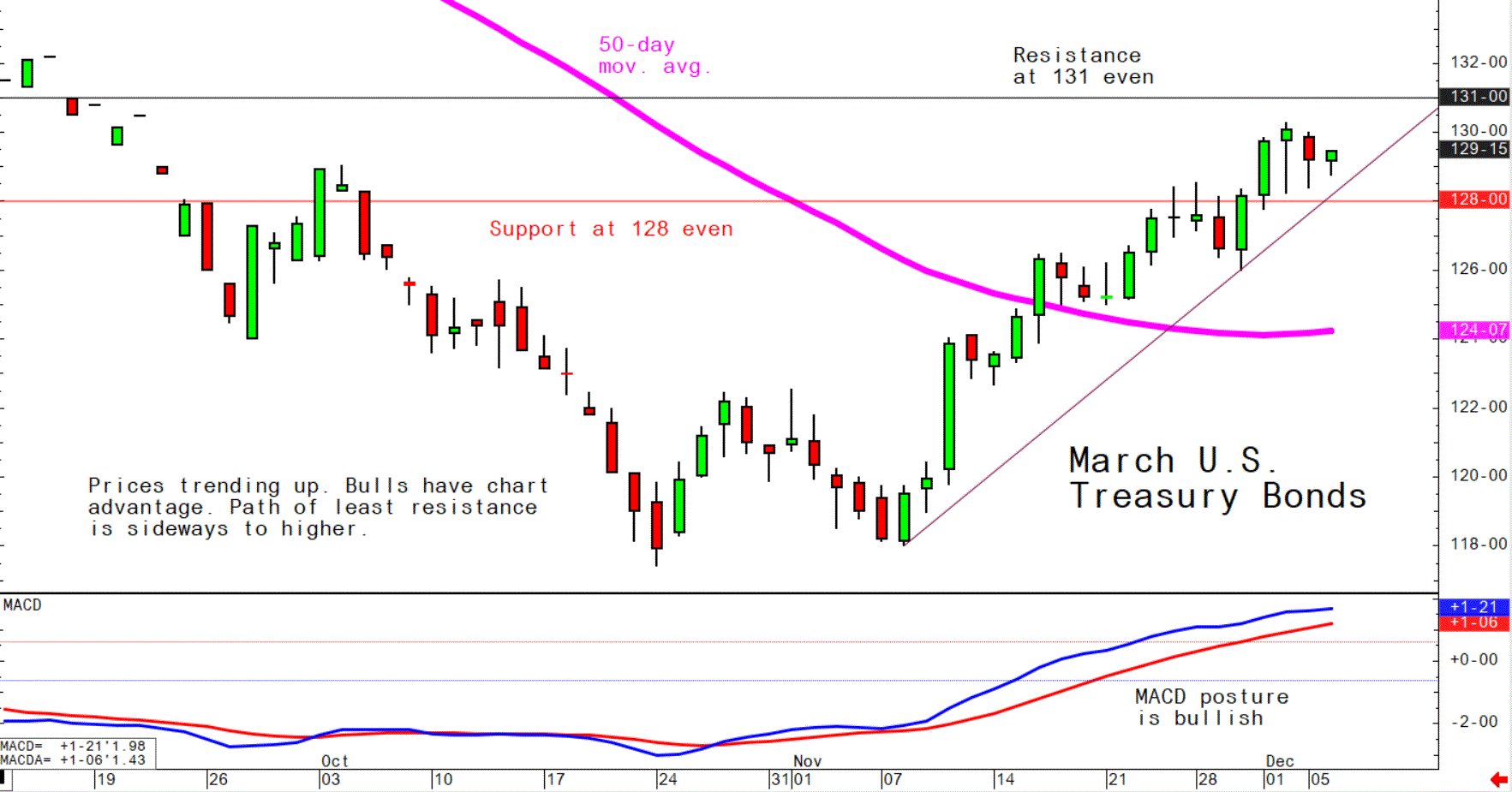U.S. Dollar Erases More Than Half of This Year’s Gains

Pollution tariffs | Ga. Senate race results today | U.S. trade gaps widens to four-month high
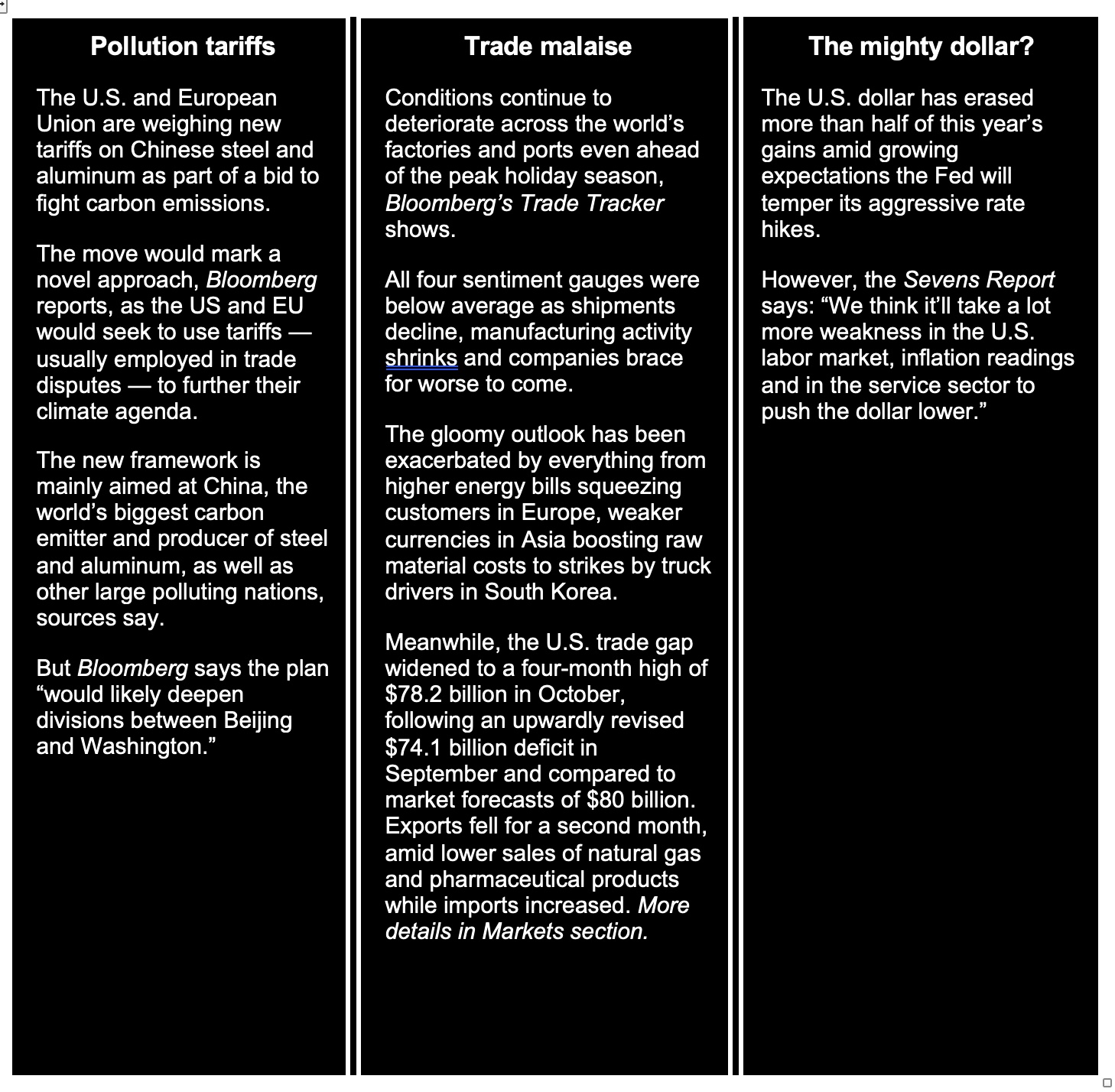
|
In Today’s Digital Newspaper |
USDA daily export sales: 264,000 metric tons of soybeans to China during the 2022-2023 marketing year; 240,000 metric tons of soybeans to unknown destinations during the 2022-2023 marketing year.
The global economy faces a rocky next year, with a recession in Europe at the start, a U.S. contraction at the end and acceleration in China, Bloomberg Economics predicts. Its base case for 2023 is global growth of a meager 2.4%, down from 3.2% this year.
PepsiCo plans to lay off hundreds. The beverage and snack giant will cut jobs at its North American headquarters, the latest sign that a wave of belt-tightening in the face of a worsening economy is expanding beyond tech and media companies.
Wharton professor Jeremy Siegel roasted Fed Chair Jerome Powell for failing to see signs of falling inflation.
American CEOs laid out their outlook in the latest index from the Business Roundtable. Details in Markets section.
The threat of a rail strike is over but that hasn’t solved all the labor problems at the U.S. freight railroads. Details from a WSJ article below.
New soy crush plant planned for Grand Forks. Epitome Energy plans to build a $400 million soybean crushing plant in Grand Forks, North Dakota. The plant will process up to 42 million bu. of soybeans per year into crude degummed soybean oil, meal and hulls. Soybean oil will likely go into the renewable diesel industry, while the meal will go into the livestock industry.
Indonesia is making plans to bring B35 biodiesel (diesel fuel with a 35% mix of palm oil-based fuel) to the market in 2023, according to Chief Economics Minister Airlangga Hartarto.
Vladimir Putin is gripping Russia's economy tighter to the country's war machine. The Kremlin has commandeered private enterprise to keep the military armed in its fight against Ukraine but faces labor and tech shortages.
In China, new Covid cases have declined for 8 consecutive days and the government is reducing testing requirements, bolstering optimism about a move away from the crippling zero-Covid policies. Meanwhile, a Communist Party official acknowledged that China’s scaling back of Covid-19 lockdowns and mass testing is a response to nationwide protests against unpopular pandemic controls.
Taiwan Semiconductor Manufacturing Company, the world’s biggest maker of leading-edge computer chips, will announce today that it plans to drastically expand and revamp its factory in Arizona. The $40 billion initiative — significant enough that President Biden and Tim Cook, Apple’s CEO, will attend a celebration of the announcement.
IEA released its largest-ever upward revision of renewable power forecasts. Details in Energy section.
Manchin’s permitting reform is getting a final look during lame-duck defense talks.
Restaurant groups escalate their fight against a California law on fast-food workers.
Prop 12 enforcement will wait in California for Supreme Court ruling.
Vilsack: ‘Precision nutrition’ to combat diet-related diseases. Details in Health section.
Homeland Security pushes the deadline for Real ID to 2025. The U.S. Department of Homeland Security on Monday pushed the date by which travelers will need the federally compliant identification card for domestic flights to May 7, 2025. The previous deadline was May 3, 2023.
Georgia Senate race results today. Republican Herschel Walker faces incumbent Raphael Warnock in the runoff race for the Senate today. The candidates were forced into a runoff after neither Warnock, 53, nor Walker, 60, got more than 50% of the vote in the Nov. 8 midterm election. The outcome will determine whether Democrats hold a 51-49 majority or have 50-50 control with the VP as a tie-break.
|
MARKET FOCUS |
Equities today: Global stock markets were mixed overnight. U.S. Dow opened 40 points lower and then turned slightly higher. In Asia, Japan +0.2%. Hong Kong -0.4%. China flat. India -0.3%. In Europe, at midday, London -0.3%. Paris -0.2%. Frankfurt -0.2%.
U.S. equities yesterday: The Dow ended down 482.78 points, 1.40%, at 33,947.10. The Nasdaq dropped 221.56 points, 1.93%, at 11,239.94. The S&P 500 fell 72.86 points, 1.79%, at 3,998.84.
The bond rally is being tested by wage gains. Hopes that inflation is easing have driven a weekslong rally in government bonds, pulling the 10-year U.S. Treasury yield back to its lowest levels since September.
Agriculture markets yesterday:
- Corn: December corn futures fell 5 3/4 cents to $6.40 1/2, the contract’s lowest close since $6.36 1/4 on Aug. 22.
- Soy complex: January soybeans rose 3/4 cent to $14.37 3/4. January soymeal surged $8.00 to $432.10, the contract’s highest close since Sept. 20. January soyoil plunged 265 points to 62.57 points, the lowest close since Oct. 3.
- Wheat: March SRW wheat fell 22 cents to $7.39, the contract’s lowest close since October 2021. March HRW fell 29 cents to $8.41 3/4, the lowest close since Aug. 18. March spring wheat fell 19 1/4 cents to $9.02.
- Cotton: March cotton rose 66 points to 83.86 cents.
- Cattle: February live cattle fell 5 cents to $155.825. January feeder cattle gained $1.325 to $183.775, the highest close since Sept. 19. Live steers averaged $156.42 last week, up 35 cents from the previous week and the ninth consecutive weekly increase.
- Hogs: February lean hogs rose 10 cents to $90.525, the contract’s highest close since Nov. 17. The CME lean hog index fell 37 cents to $82.87, the lowest level since late January, and is expected to fall another 8 cents today.
Ag markets today: Soybean futures posted double-digit gains overnight while corn traded slightly higher, and the wheat market was mixed. As of 7:30 a.m. ET, corn futures were trading 1 to 3 cents higher, soybeans were mostly 11 to 15 cents higher and wheat futures were a penny lower to 2 cents higher. Front-month crude oil futures were around $1 lower and the U.S. dollar index was more than 300 points lower
Technical viewpoints from Jim Wyckoff:
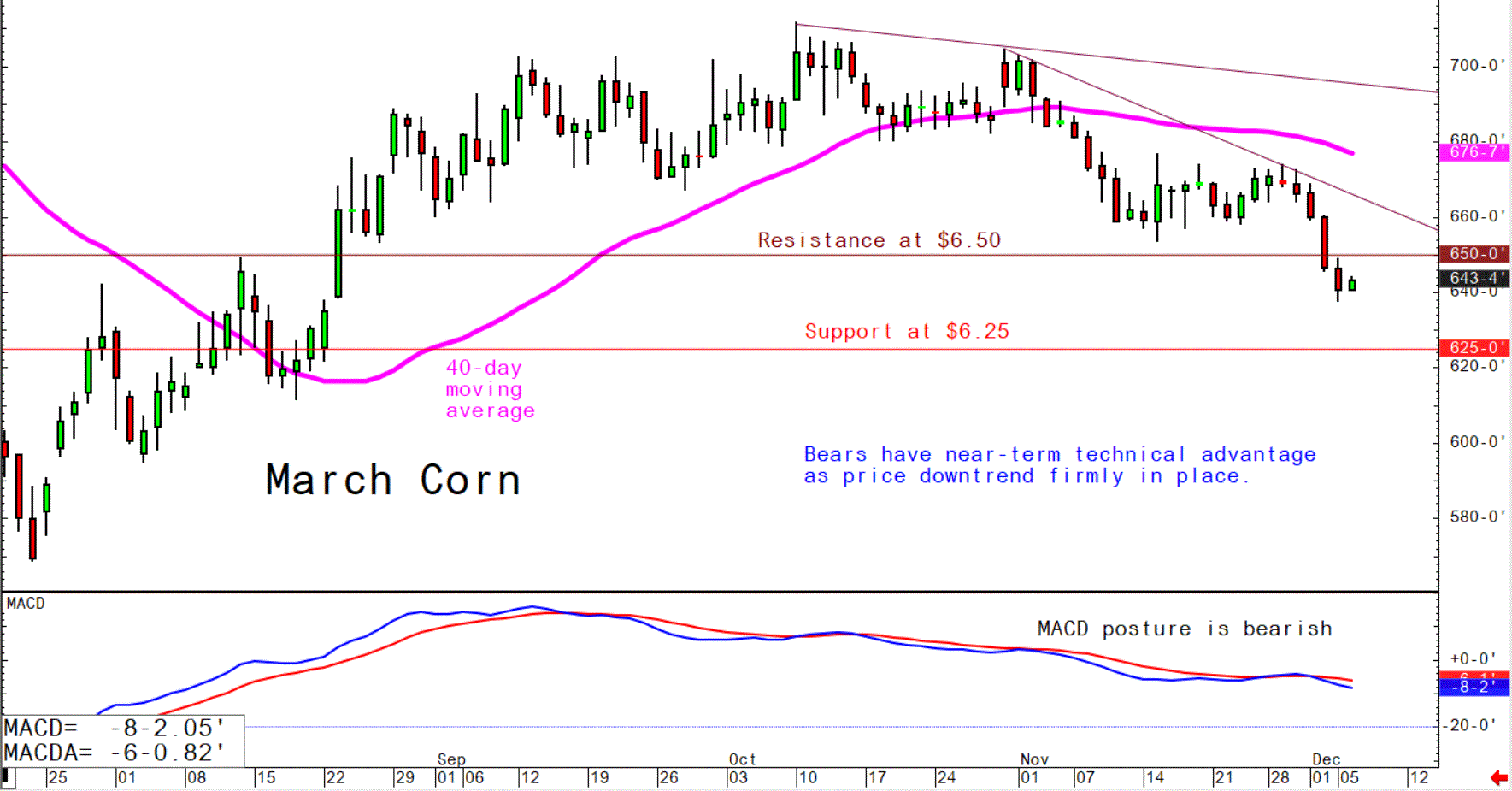
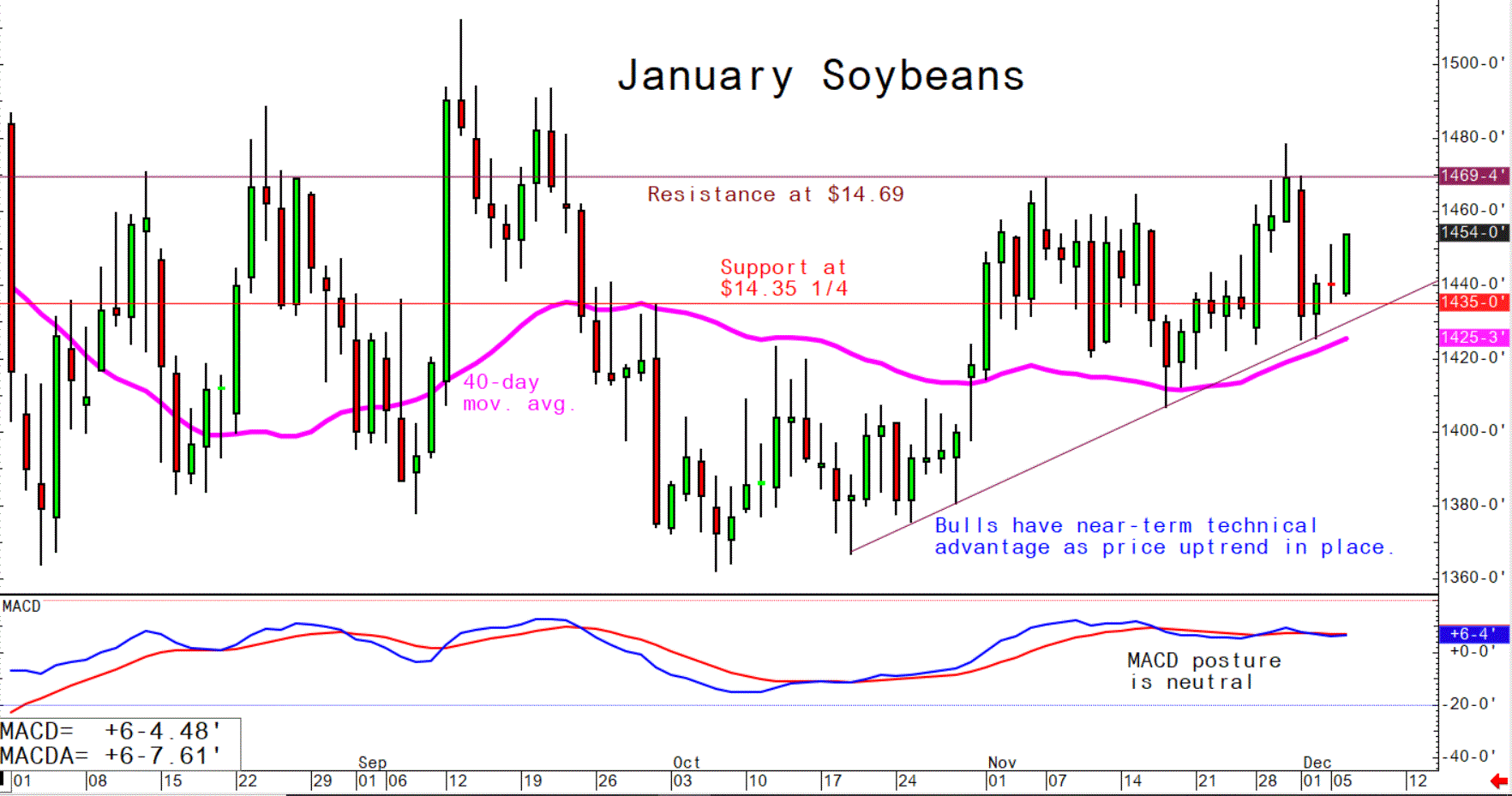
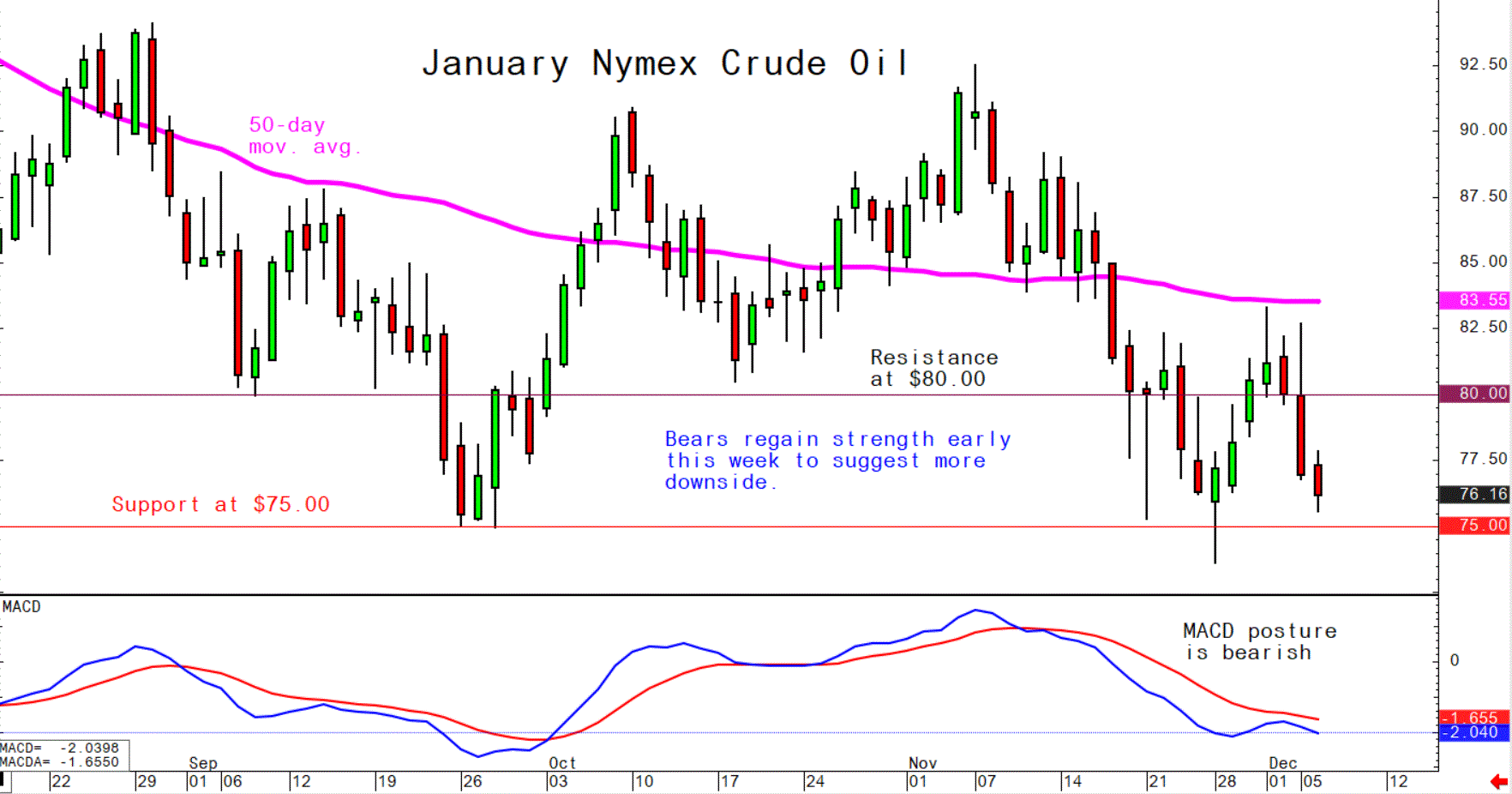
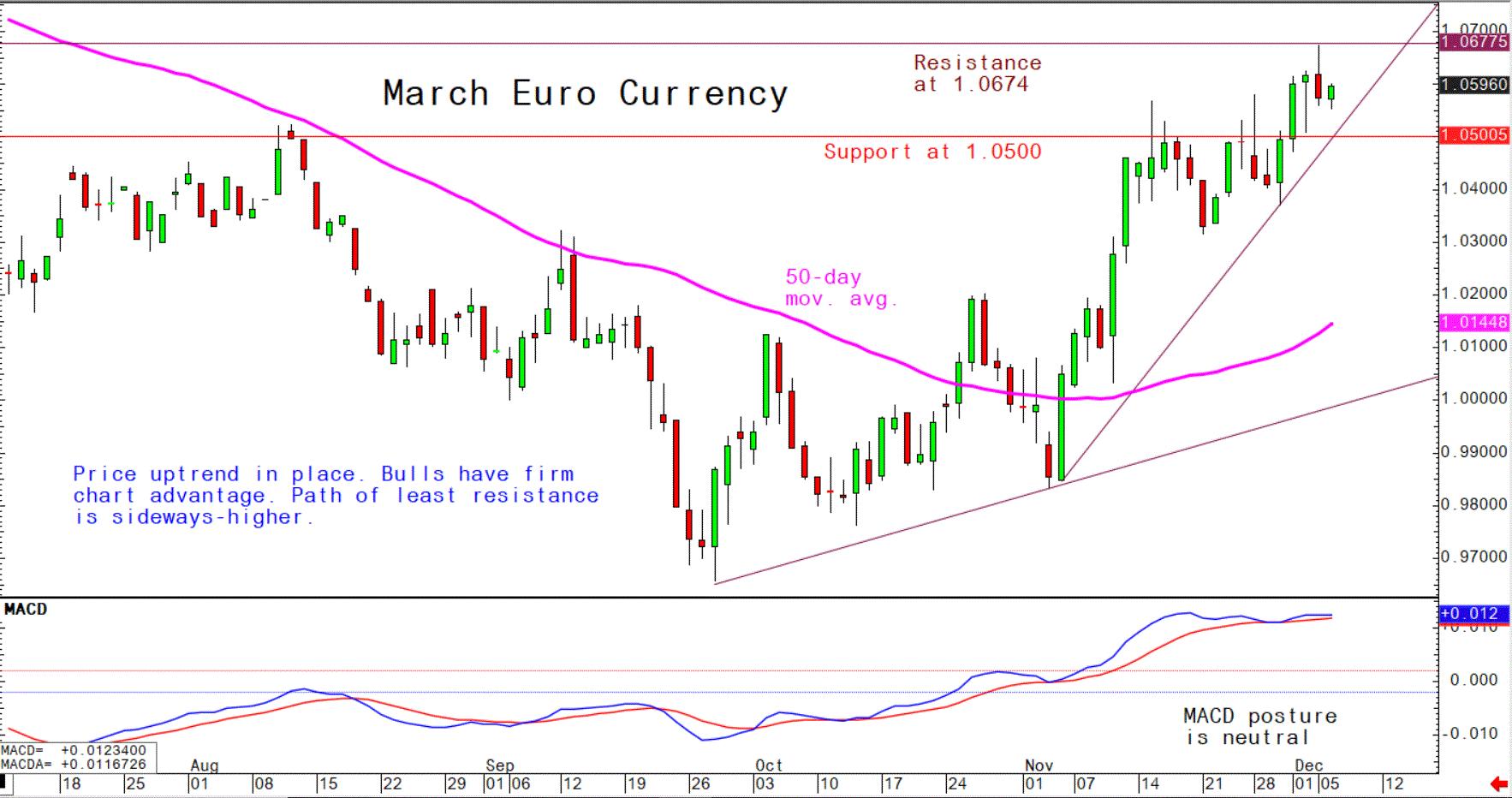
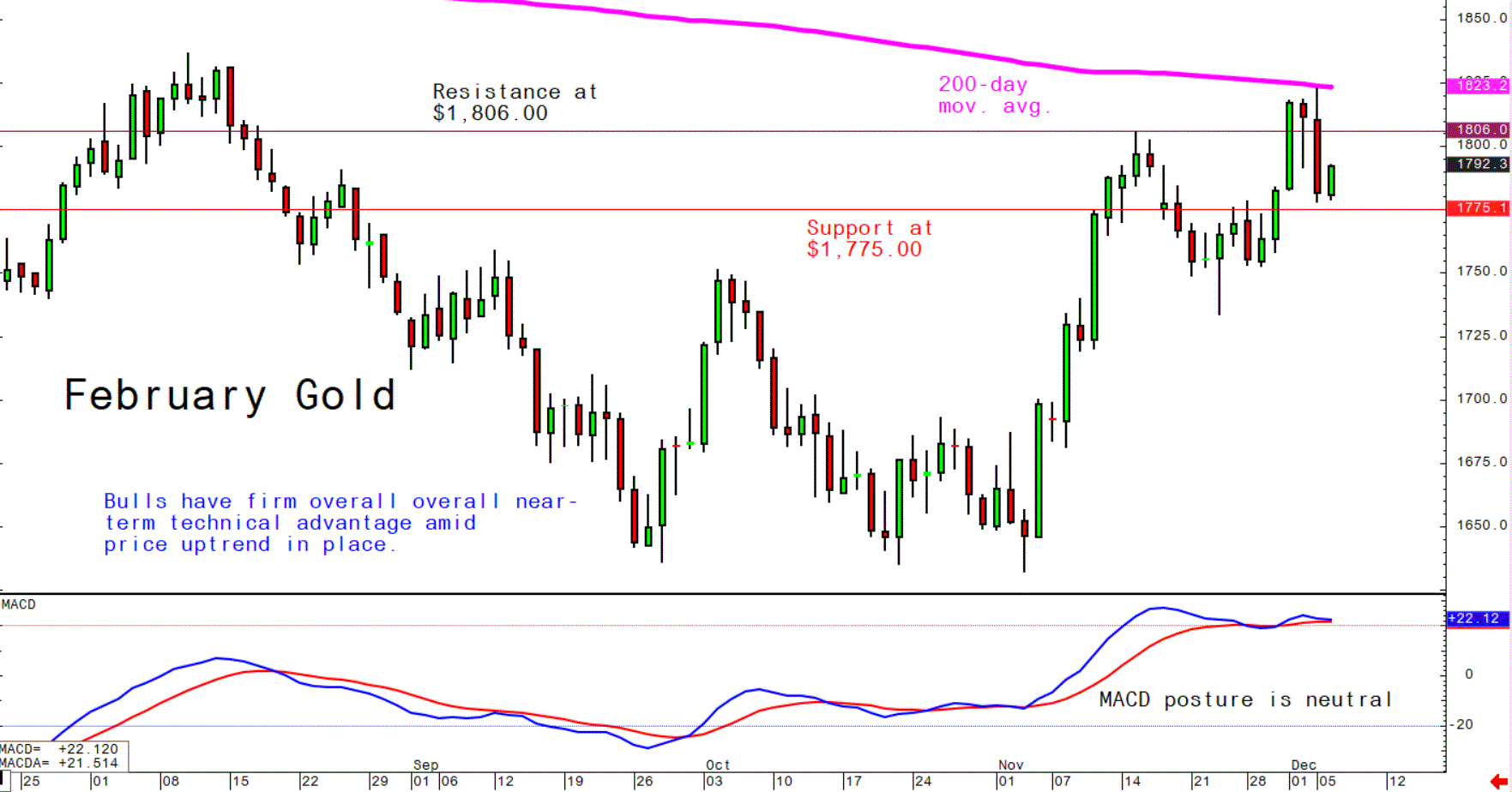
On tap today:
• U.S. trade deficit is expected to widen to $80 billion in October from $73.28 billion one month earlier. (8:30 a.m. ET) UPDATE: The U.S. trade gap widened to a four-month high of $78.2 billion in October, following an upwardly revised $74.1 billion deficit in September and compared to market forecasts of $80 billion. Exports fell for a second month, amid lower sales of natural gas and pharmaceutical products while imports increased.
Imports to the U.S. increased by $2.2 billion, or 0.6%, to $334.8 billion in October 2022, moving closer to March's all-time high of $351.1 billion, helped by a strong dollar and suggesting domestic demand in the world's largest economy remains strong. Purchases of goods were up by $2.4 billion, led by imports of other goods (up $1.4 billion) and industrial supplies and materials (up $1.1 billion), such as fuel oil, finished metal shapes and nuclear fuel materials. Also, shipments of passenger cars increased $0.7 billion. On the other hand, imports of consumer goods were down by $0.6 billion, due to lower purchases of cell phones and other household goods, as well as toys, games, and sporting goods. Imports of services decreased by $0.2 billion, driven by transport.
Exports from the U.S. decreased by $1.9 billion to $256.6 billion in October 2022, down for a second consecutive month, suggesting external demand weakened further amid high inflation, rising borrowing costs and a strong dollar. Exports of goods were down $3.7 billion, led by lower sales of industrial supplies and materials (down $2.4 billion) such as natural gas and other petroleum products; and consumer goods (down $2.0 billion) on the back of pharmaceutical preparations. Meanwhile, exports of foods, feeds, and beverages were up $0.5 billion, boosted by sales of soybeans. Exports of services increased $1.8 billion, led by travel, transport and other business services.
• WSJ CEO Council Summit continues in Washington, D.C. Tuesday's speakers include ExxonMobil CEO Darren Woods, International Monetary Fund Deputy Managing Director Gita Gopinath, Walgreens Boots Alliance CEO Rosalind Brewer, former Supreme Court Justice Stephen Breyer, Federal Trade Commission Chair Lina Khan, and Goldman Sachs CEO David Solomon.
A resilient U.S. economy. The ISM Services PMI released Monday unexpectedly jumped to 56.5 in November of 2022, rebounding from a more than 2-year low of f 54.4 hit in October and beating market forecasts of 53.3. Business activity increased faster (64.7 vs 55.7) and employment rebounded (51.5 vs 49.1), prompted by a new fiscal period and the holiday season. Also, price pressures eased (70 vs 70.7), inventories shrank less (47.9 vs 47.2) and supplier deliveries continued to slow (53.8 vs 56.2), with increased capacity and shorter lead times accounting for an improvement in supply chain and logistics performance. Meanwhile, a slowdown was seen in new orders (56 vs 56.5) and backlogs of orders (51.8 vs 52.2).
Upshot: The Fed’s higher interest rates are not yet significantly impacting the U.S. economy. The data signals the Federal Reserve could raise interest rates for longer. Traders are still pricing in a 0.5 percentage point hike at the Dec. 13-14 Fed meeting, with a 20% chance of another supersize 0.75 percentage point increase.
Wharton professor Jeremy Siegel roasted Fed Chair Jerome Powell for failing to see signs of falling inflation. "Very honestly, I don't know what planet he lives on," Siegel said on CNBC, pointing to falling home prices and other indicators. "To be blunt, here's a Fed that caused the inflation by expanding liquidity greater than any other time in history, is basically talking as if, to the worker 'we're not going to let you catch up to the inflation that I caused,'" Siegel said. "That's a slap in the face to the American worker, in my opinion…Is that good public policy?"
American CEOs laid out their outlook in the latest index from the Business Roundtable. The CEO Economic Outlook Survey, which measures conditions over the next six months, declined 11 points from last quarter to 73, continuing a downward trend that has taken shape over the past year. The index even dipped below its long-run average of 84 since Q3 of 2020, though it remains above the expansion or contraction threshold of 50.
CEOs see slower hiring, softer sales and decreased capital investment in the near-term, but the economy isn't facing a critical crisis or full-scale recession. 2023 will likely see a growth slowdown as the Fed pumps the brakes to rein in inflation, though it won't be accompanied by widespread unemployment or systematic consequences.
Key comments. "To strengthen the economy, Business Roundtable urges Congress and the Administration to undertake pro-growth policies, including restoring full and immediate expensing of American R&D investments this session and reforming the permitting system to expedite energy infrastructure projects," said Business Roundtable CEO Joshua Bolten. "We urge U.S. policymakers to position America for the strongest economic recovery possible," added GM CEO Mary Barra, who chairs the Business Roundtable. "Sound policy action in the short term will yield long-term economic benefits and lay a solid foundation for our growth and competitiveness."
Other stats: 49% of the 142 Business Roundtable CEOs identified labor costs as their top cost pressure, followed by 15% who flagged material costs and 14% who mentioned supply chain disruptions. Other leading pressures were associated with energy and regulatory costs.
PepsiCo is laying off hundreds of workers in headquarters roles. The cuts affect the company’s North America beverage business, which is based in Purchase, N.Y., and its North America snacks and packaged-foods business, which has headquarters in Chicago and Plano, Texas, according to people familiar with the matter and documents reviewed by The Wall Street Journal.
The threat of a rail strike is over but that hasn’t solved all the labor problems at the U.S. freight railroads. The carriers are continuing to face service disruptions and restrictions on shipments, the Wall Street Journal reports (link), as they struggle to bring on enough staff to handle customer demand. Union Pacific and BNSF Railway this year have issued more embargoes than in previous years as they have coped with congestion in their networks. Railroad operators say they have had insufficient numbers of train and engine workers, and unions representing other types of railroad hands say they too have shortages. The slowdowns are troubling shippers, drawing the attention of regulators, and the Surface Transportation Board is holding a hearing on the embargoes later this month. Union Pacific calls embargoes a “tool of last resort,” but shippers say they are the first to feel the impact of the growing restrictions.
Key quote: “Congestion: a railroad euphemism for ‘we don’t have enough crews to move our trains to keep our network fluid.’” — Martin Oberman, chairman of the Surface Transportation Board.
A huge chip plant announcement today. Taiwan Semiconductor Manufacturing Co. (TSMC) today (Dec. 6) will unveil plans to increase its investment in Arizona from $12 billion to $40 billion, as the company plans to open another chip plant in the state. President Joe Biden is set to join TSMC founder Morris Chang and Apple CEO Tim Cook in a visit to the company’s Phoenix plant, which is expected to start producing chips by 2024. Biden has been pressing for improvements to the chip supply chain as industries from autos to computing have struggled with an overdependence on Chinese suppliers.
Perspective: The visit to a foreign company’s factory reflects the U.S. reliance on TSMC to boost American chip manufacturing. The U.S. makes about 12% of the world’s chips compared with 37% three decades ago. TSMC has built a broad ecosystem of talent and suppliers in Taiwan that will be hard to duplicate. The company says the cost of making chips in Arizona may be at least 50% higher than in Taiwan.
Manufacturing orders in Germany increased in October after falling the previous two months, a sign demand for goods could be slightly recovering. Factory orders rose 0.8% compared with September, according to price-adjusted data from the German statistics office.
Inflation near a peak but more ECB rate hikes needed. The European Central Bank (ECB) will have to raise interest rates several more times to tame price pressures, even if headline inflation is now close to its peak, ECB chief economist Philip Lane said. “We do expect that more rate increases will be necessary, but a lot has been done already,” Lane told Milano Finanza. “I would be reasonably confident in saying that it is likely we are close to peak inflation.” Having raised rates by a combined 200 basis points (bps) since July to fight off record high inflation, ECB has signaled a slowdown in the pace of monetary tightening this month after back-to-back 75 bps point moves.
Market perspectives:
• Outside markets: The U.S. dollar index was weaker amid a mostly weaker tone in global currencies except a small rise for the ersus the euro. The yield on the 10-year US Treasury note was weaker, trading around 3.55%. U.S. crude was around $75.85 per barrel and Brent around $81.50 per barrel. Gold and silver futures were higher ahead, with gold around $1,792 per troy ounce and silver around $22.75 per troy ounce.
• Gas prices are back to where they were before Russia's Feb. 24 invasion of Ukraine. The most common U.S. gas price used by motorists dropped 40 cents from last week to $2.99 per gallon, says head of petroleum analysis at GasBuddy Patrick De Haan.
• U.S. natural gas futures fell by more than 8% below $5.8MMBtu, closing in on the lowest since July 6 on expectations of higher supply and milder weather across the U.S. over the next two weeks. The restart of the Freeport LNG export plant due to take place in the mid of December was pushed until the end of the month as the company is still waiting for regulatory approval, leaving more gas in the domestic market. Also, average gas output in the U.S. Lower 48 states rose to a record 99.5 bcfd in November, up from 99.4 bcfd in October. Meanwhile, warmer-than-usual temperatures should allow utilities to leave more gas in storage which is now around 2.4% below the five-year (2017-2021) average for this time of year. However, U.S. gas futures are up nearly 75% so far this year as overseas demand for LNG remains strong especially from Europe after the war in Ukraine has disrupted the gas supply.
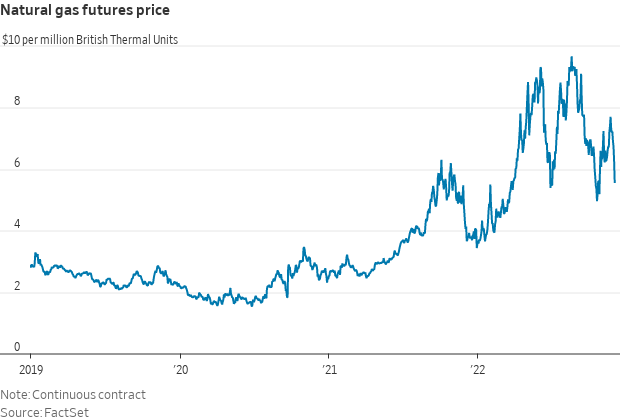
• New soy crush plant planned for Grand Forks. Epitome Energy plans to build a $400 million soybean crushing plant in Grand Forks, North Dakota, the company announced Monday. The plant will process up to 42 million bu. of soybeans per year into crude degummed soybean oil, meal and hulls. Soybean oil will likely go into the renewable diesel industry, while the meal will go into the livestock industry.
• Wheat market comment from Richard Crow, grain trader and analyst: “The wheat market now has U.S. SRW at values under French wheat on paper. The values of the two origins could be close to each other on a delivered basis to some African countries. SRW is being fed in some locations in the Eastern feed belt. The market is short a large amount of SRW.”
• Indonesia B35 biodiesel rollout planned for 2023. Indonesia is making plans to bring B35 biodiesel (diesel fuel with a 35% mix of palm oil-based fuel) to the market in 2023, according to Chief Economics Minister Airlangga Hartarto. While details are scarce, Hartarto said the government has been directed to make sure the action takes place. “With the implementation of B35, it will reduce our dependency on (oil) imports,” he said, without offering a timeline for the move. The country is currently wrapping up trials on B40 fuel but there is no timeline on when that fuel could be brought to the market. Indonesia currently mandates B30 fuel. Bottom line: The increase blend would use around 1.5 million tons of additional palm oil.
• Ag trade: South Korea purchased 50,000 MT of U.S. milling wheat, 65,000 MT of Australian feed wheat and 65,000 MT of corn expected to be sourced from South America. Taiwan tendered to buy up to 65,000 MT of corn to be sourced from the U.S., Brazil, Argentina or South Africa. Japan is seeking 154,957 MT of wheat in its weekly tender.
• NWS weather: Heavy rain and isolated flash flooding potentials shift westward from the Tennessee Valley today to the central Plains later on Wednesday into Thursday... ...Accumulating snows across the northern Plains and through portions of the northern and central Rockies... ...Widespread much above average temperatures across the southern and eastern U.S. in stark contrast with arctic air across the northern Plains.
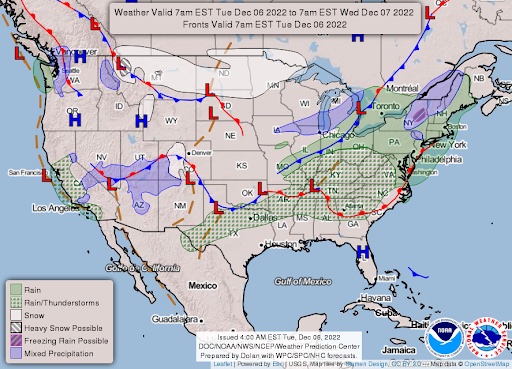
Items in Pro Farmer's First Thing Today include:
• Soybeans and corn firmer, wheat mixed overnight
• Consultant lowers Argentine crop estimates
• Aussie weather bureau: La Niña to continue for now
• Heavy pressure on wholesale beef prices continues
• Modest drop in cash hog index
|
RUSSIA/UKRAINE |
— Summary: Russia launched a fresh barrage of missiles toward Ukraine on Monday as it accused Kyiv of striking military airfields deep inside its territory. The Russian attacks cut off water and electricity supplies in some areas amid freezing temperatures and killed at least one person, local authorities said. The port city of Odesa appears to be among the worst affected regions as officials say "all pumping station and reserve lines are without power -- thus consumers don't have water." In Ukraine's capital, Kyiv, about 40% of people are without power after an energy facility was hit on Monday, military officials said. Despite the strikes, Ukrainian President Volodymyr Zelensky has claimed a high success rate in intercepting the Russian missiles.
- Europe and the U.S. started enforcing both a price cap on Russian oil that aims to increase economic pressure on Moscow and an embargo under which European nations will no longer be able to buy most Russian crude.
- Putin faces some tests at home. After a string of battlefield losses in Ukraine in recent months, President Vladimir Putin faces a big test at home: mobilizing Russia’s economy to feed the war effort. State budget data show rising defense expenditures, and the Kremlin has commandeered private enterprise to help keep the military armed. But the country faces labor and tech shortages, and Russia’s key source of revenue, oil sales, has become imperiled by low prices, Western embargoes and a new price cap on Russian crude, the Wall Street Journal reports (link).
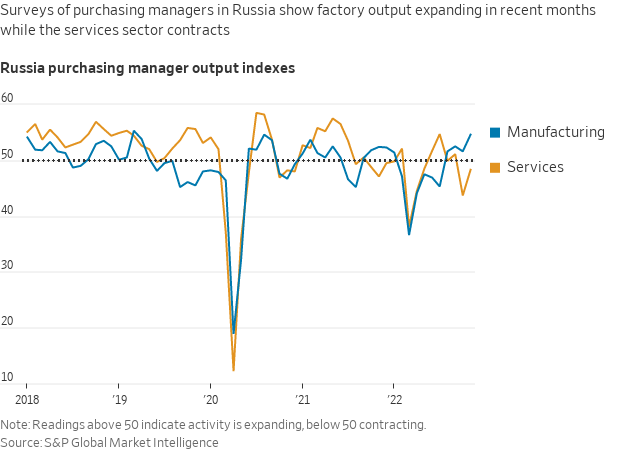
- The Russian ruble weakened to 63 per USD in December, the lowest in nearly two months, as the start of the EU oil embargo is set to hamper Russian exports and demand for the ruble. Still, the ruble remains above levels prior to Russia’s Feb. 24 invasion of Ukraine and cementing the rebound from the record-low of 150 touched in March. Strict capital controls and trade imbalances supported the currency as Moscow’s increasing isolation from the international community hit Russia’s economy.
- Support easing for indefinite U.S. aid to Ukraine: poll. Some 47% of Americans think Washington should urge Ukraine toward a swift peace settlement, according to the Chicago Council on Global Affairs survey. More than two-thirds of respondents back supplying Ukraine with weapons and economic assistance, and about three-quarters support accepting Ukrainian refugees and sanctioning Russia, according to the survey conducted last month. Republican backing for aid to Ukraine has slipped since the spring, with 55% of Republicans saying they support sending military aid, compared with 68% in July and 80% in March. Half of Republicans favored providing economic assistance to Ukraine last month, compared with roughly three-quarters in March, according to the Chicago Council’s findings.
Background: The U.S. announced its latest tranche of military aid to Ukraine last month — the 25th since August 2021. The $400 million package includes additional arms, munitions and equipment, the Defense Department said, and brings total U.S. military assistance to Ukraine to nearly $20 billion since President Biden took office. The U.S. is also sending $53 million to help repair Ukraine’s electrical systems, which have sustained significant damage from Russian missile strikes in recent weeks.
|
POLICY UPDATE |
— Payments under USDA disaster, Covid aid edged higher for the latest reporting week. Payments under the Emergency Relief Program (ERP) increased to $7.20 billion as of Dec. 4, up from $7.18 billion the prior week. The payment total includes $6.15 billion for non-specialty crops ($6.14 billion prior) and $1.05 billion for specialty crops ($1.04 billion).
Payments under the Coronavirus Food Assistance Program (CFAP) efforts also edged higher, with total CFAP 2 payments now at $19.16 billion ($19.15 billion prior) and CFAP 1 payments stand at $11.83 billion ($11.82 billion). Totals within each program for original payments and top-up payments were little changed.
|
PERSONNEL |
— EPA taps White House climate official for greenhouse gas program. Jahi Wise has been appointed to senior adviser to the administrator and acting director for the Greenhouse Gas Reduction Fund program of the EPA, according to the agency.
|
CHINA UPDATE |
— A Communist Party official acknowledged that China’s scaling back of Covid-19 lockdowns and mass testing is a response to nationwide protests against unpopular pandemic controls. Chinese stocks have recently been whipsawed by Beijing's attempts—and struggles — to move past the pandemic. Link for details.
— Saudi Arabia: China’s Xi to visit this week. Saudi Arabia said Chinese President Xi Jinping will visit the kingdom from Wednesday for a summit that will showcase growing ties. Link for more via Bloomberg.
— Republicans warn Biden: Don’t let green goals override forced labor concerns in China. Republicans are warning the Biden administration not to prioritize green energy goals over enforcing federal import restrictions meant to discourage alleged human rights abuses in China.
|
ENERGY & CLIMATE CHANGE |
— Newsom, accusing oil industry of price gouging, unveils California plan to cap refinery profits. California Democratic Gov. Gavin Newsom unveiled an outline of his plan to place a cap on oil refinery profits in California, a proposal he's asking lawmakers to approve in hopes of reducing future spikes in gasoline prices. According to a draft of Newsom's plan, he is asking the Legislature to enact a yet-to-be-determined profit cap based on a monthly calculation of the average profit per barrel that an oil refiner earns for wholesale gasoline. The governor's proposal allows for penalties for violations of the profits cap and new regulatory review and oversight, giving the Energy Commission expanded authority to investigate supply and price issues. Link for details via the Los Angeles Times.
— Manchin’s permitting reform getting a final look during lame-duck defense talks. Top Democrats are trying to include a version of permitting legislation backed by sometimes centrist Sen. Joe Manchin (D-W.Va.) into the must-pass annual defense bill. It stems from a deal Manchin made with Senate Majority Leader Chuck Schumer (D-N.Y.) to support the Inflation Reduction Act. Democrats, under pressure from environmental justice advocates, decided against passing the permitting policies in September.
Democrats also appear to be uncertain over the idea of rolling back Covid vaccination requirements in the military, which would be a win for the GOP. President Biden and the Defense Department signaled yesterday they don’t support that idea, which Democrats had been prepared to offer as an olive branch to Republicans.
Meanwhile, the White House says it supports an effort to attach previously stalled legislation to fast-track energy projects backed by onto the defense bill. “The president believes we should pass the defensive authorization bill, and that the permitting bill should be included in that legislation, so that is something that we support from here,” White House Press Secretary Karine Jean-Pierre told reporters Monday.
— No real charge in “Buy America” requirements for EV charging stations. Implementation of major legislation is always a difficult process. And that is the case with installing billions of dollars’ worth of electric vehicle (EV) charging stations. The requirement could hurt efforts to deploy a new national network of electric vehicle charging stations as state transportation officials and companies in the charging industry are pushing the Biden administration to delay a January deadline for chargers to be made in the U.S., citing a need to ramp up domestic production first.
— IEA released its largest-ever upward revision of renewable power forecasts. The International Energy Agency (IEA) sees an additional 2,400 gigawatts of capacity coming online worldwide over the next half-decade. That forecast is almost 30% higher than last year's edition of the rolling 5-year projections. The agency now sees renewables surpassing coal as the largest source of global power generation by 2025.
Upshot: "Fossil fuel supply disruptions have underlined the energy security benefits of domestically generated renewable electricity, leading many countries to strengthen policies supporting renewables," IEA said. More expensive fossil fuels also tilt the playing field toward solar and wind.
— EV naysayers should note a recent report. New analysis from Columbia University's energy think tank explores a wide set of medium- and long-term EV projections from 2019 and late 2021. The analyses see EVs ranging from 11% to 63% of global passenger car sales in 2030 and from 31% to almost 100% in 2050. Link to report.
— Feds investigate North Carolina power station attack. The FBI is probing an intentional gunfire attack on two North Carolina electrical substations. Energy Secretary Jennifer Granholm said she’d be in contact with the utility, and the agency’s Office of Cybersecurity, Energy Security, and Emergency Response was working with other federal departments on the incident. The attack comes amid growing concern from federal officials about the vulnerability of the nation’s power grid to terrorism and the security of key pieces of equipment.
— Most Ford dealers sign up for EV plan. Ford, which is now a distant no. 2 behind Tesla in the U.S. electric vehicle market, is getting support from most of its dealers as it invests more aggressively in EVs. CEO Jim Farley said Monday that 65% of the company’s approximately 3,000 dealers in the U.S. have agreed to sell EVs under Ford’s “EV certified” programs. Ford is requiring dealers to sell EVs if they want to continue selling that company’s vehicles. “We think that the EV adoption in the U.S. will take time, so we wanted to give dealers a chance to come back,” Farley said. Dealers that opt out of the Ford EV program now will have another chance to sign up in 2027.
— Wind farms in the Pacific Ocean. The Bureau of Ocean Energy Management today will kick off the first-ever U.S. lease auction for commercial-scale floating wind farms in the Pacific Ocean, with 43 worldwide companies approved to bid. The auction includes three areas off California's central coast and two off the state's northern coast that have the potential to generate 4.5 gigawatts of power. Link for details via the Associated Press.
Meanwhile, to boost permitting of clean energy projects, the Interior Department will start identifying new areas on public lands in the western United States primed for solar power development. As part of the renewables push, the agency will update an Obama-era plan that had established special zones for solar projects across six states — Arizona, California, Colorado, Nevada, New Mexico and Utah — with the possibility of adding more states to the list. Link for more via Reuters.
|
LIVESTOCK, FOOD & BEVERAGE INDUSTRY |
— Restaurant groups escalate their fight against a California law on fast-food workers. An industry coalition said it has collected enough voter signatures to move forward with a ballot initiative seeking to block a state law setting minimum hourly wages. The measure could go up for a vote in 2024.
— Prop 12 enforcement will wait in California for Supreme Court ruling. A California judge extended his ban on enforcement of voter-approved Proposition 12 until July 1, to allow time for the Supreme Court to rule on the constitutionality of the animal welfare law. The Sacramento County Superior Court injunction was to expire on Feb. 28. Justices heard arguments on the farm-group challenge of Prop 12 in October and a decision is expected by the end of June. Approved in a statewide referendum in 2018, Prop 12 requires hog farmers to provide at least 24 square feet of floor space for breeding sows and it bars the sale of pork produced on farms that do not meet California’s standards. The pork industry prefers sow crates that greatly restrict movement by sows and argues that Prop 12 violates the dormant Commerce Clause by setting unfair barriers to interstate trade.
|
HEALTH UPDATE |
— Summary:
- Global Covid-19 cases at 645,959,757 with 6,642,550 deaths.
- U.S. case count is at 99,023,619 with 1,081,638 deaths.
- Johns Hopkins University Coronavirus Resource Center says there have been 655,280,140 doses administered, 267,346,533 have received at least one vaccine, or 81.14% of the U.S. population.
— Blood test could detect Alzheimer’s years before symptoms occur. The latest test focuses on amyloid beta proteins that have misfolded and are starting to clump together in the brain, a hallmark of Alzheimer’s disease. At one time, they could only be found during an autopsy. Now they are often uncovered with advanced imaging tests. Link for details.
— Vilsack: ‘Precision nutrition’ to combat diet-related diseases. USDA said it would accelerate research into diet-related diseases as part of President Biden’s “Cancer Moonshot” to reduce the cancer death rate by at least half over the next 25 years. “Precision nutrition,” to fine-tune individual diets for health, will be one of the areas of study, said USDA Secretary Tom Vilsack. The new Agricultural Science Center of Excellence for Nutrition and Diet for Better Health (ASCEND for Better Health) would coordinate research and transmit the results to the public, said Vilsack and USDA chief scientist Chavonda Jacob-Young during a video unveiling. It will be a “virtual” center rather than scientific campus. USDA currently spends more than $180 million a year on diet-related research at its own facilities or through grants. No additional funding would accompany the initiative. Vilsack said the project “will help to coordinate and evaluate precision nutrition science to better understand relationships with food and nutrition within specific populations, particularly in historically under-served communities.”
“The reality is we still have a national food problem,” Vilsack said. “Diet-related chronic diseases — cancer, obesity, heart disease, stroke, Type II diabetes — continue to be on the rise and we recognize that when it comes to using food and nutrition to improve health-related outcomes for individuals, we cannot take a one-size-fits-all approach.” Said Jacobs-Young, “We are not naive. We recognize this issue is complex.”
|
POLITICS & ELECTIONS |
— Georgia runoff to settle last U.S. Senate seat. Georgia voters today will decide the final Senate contest in the country, choosing between Democratic incumbent Sen. Raphael Warnock and Republican challenger Herschel Walker. Polls show Warnock with a slight lead.
There is a notable difference between a 51-seat majority and a 50-50 majority. If Warnock holds on, Democrats will have actual majorities on committees, allowing President Biden’s nominees to be confirmed more easily. Holding a committee majority would also give Democrats the ability to use subpoena power without GOP support.
Leading up to Election Day, early voting in the Peach State set a number of single-day records and around 1.85 million had already been cast before the period ended on Friday. Reflecting the critical significance of the race, spending by the candidates and outside groups has neared $400 million, making it the most expensive contest in the 2022 election cycle, according to data compiled by OpenSecrets.org.
A survey by Emerson College and The Hill late last week found Warnock with a 2-point lead. Among those surveyed who had already voted, Warnock had a 29-point advantage.” The New York Times says Walker’s “Republican allies believe he needs to win about 60% of the in-person vote — about four percentage points more than his advantage in last month’s general election.”
— Klain expects Biden to announce re-election bid shortly after holidays. Bloomberg reports (link) that at the Wall Street Journal’s CEO Council summit on Monday night, White House Chief of Staff Ron Klain said he expects that President Joe Biden will announce he’s running for re-election after the U.S. Christmas and New Year’s holidays. Klain said, “The president will make that decision. I expect it shortly after the holiday. I expect the decision will be to do it.”
— Arizona certified the results of the 2022 midterm elections. The state will have Democrats as governor, secretary of state and in both U.S. Senate seats for the first time since 1950. The certification ceremony, overseen by the state’s current Republican governor and secretary of state, comes as Kari Lake, the GOP candidate for governor, and state Rep. Mark Finchem, a Republican who ran to be secretary of state, refuse to concede.
|
CONGRESS |
— The House Select Committee on the Climate Crisis will hold a hearing titled "Solving the Climate Crisis: Key Accomplishments, Additional Opportunities, and the Need for Continued Action," in what could be the last meeting for the panel as Republicans plan to shut it down when they take over the House next month.
|
OTHER ITEMS OF NOTE |
— ‘Real ID’ deadline pushed to 2025. Air travelers won’t need REAL ID-compliant forms of identification until May 7, 2025, the latest extension of security standards that were set to take effect next May. The Department of Homeland Security has repeatedly pushed back the enforcement date for travelers, which was originally set for 2020, citing state licensing agencies’ inability to issue new driver’s licenses and ID cards fast enough during the Covid-19 pandemic. “This extension will give states needed time to ensure their residents can obtain a REAL ID-compliant license or identification card,” Secretary Alejandro Mayorkas said in a statement. “DHS will also use this time to implement innovations to make the process more efficient and accessible.”
— Iran is finalizing plans to overhaul the enforcement of laws around women’s dress, as hundreds of businesses in Tehran and other cities closed their doors Monday at the start of a three-day strike called by antigovernment protesters.
— Musk’s Neuralink Under Federal Investigation Over Alleged Animal Welfare Abuses: Report. Elon Musk’s Neuralink — which promises to enable a direct interface between the human brain and computers — is being investigated by the federal government for alleged violation of the Animal Welfare Act over staff complaints about animal testing standards at the company. Link for details.
|
KEY LINKS |
WASDE | Crop Production | USDA weekly reports | Crop Progress | Food prices | Farm income | Export Sales weekly | ERP dashboard | California phase-out of gas-powered vehicles | RFS | IRA: Biofuels | IRA: Ag | Student loan forgiveness | Russia/Ukraine war, lessons learned | Election predictions: Split-ticket | Congress to-do list | SCOTUS on WOTUS | SCOTUS on Prop 12 | New farm bill primer | China outlook |

